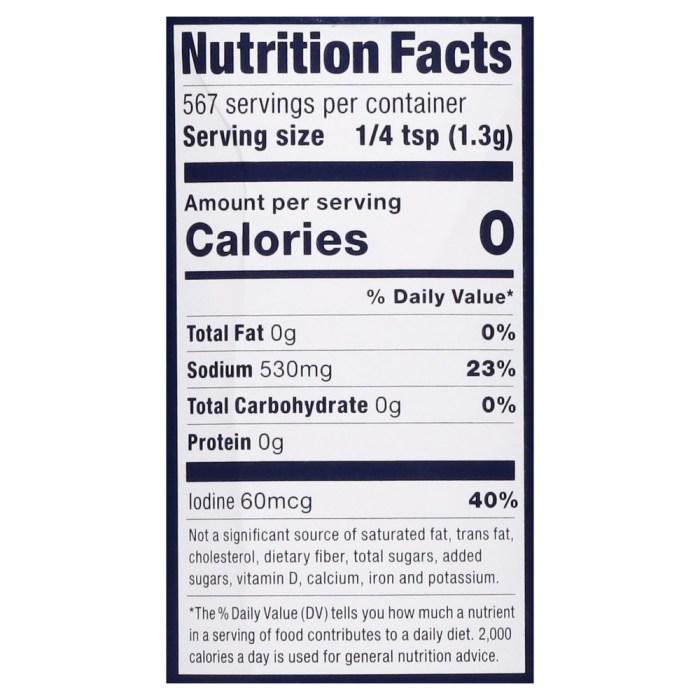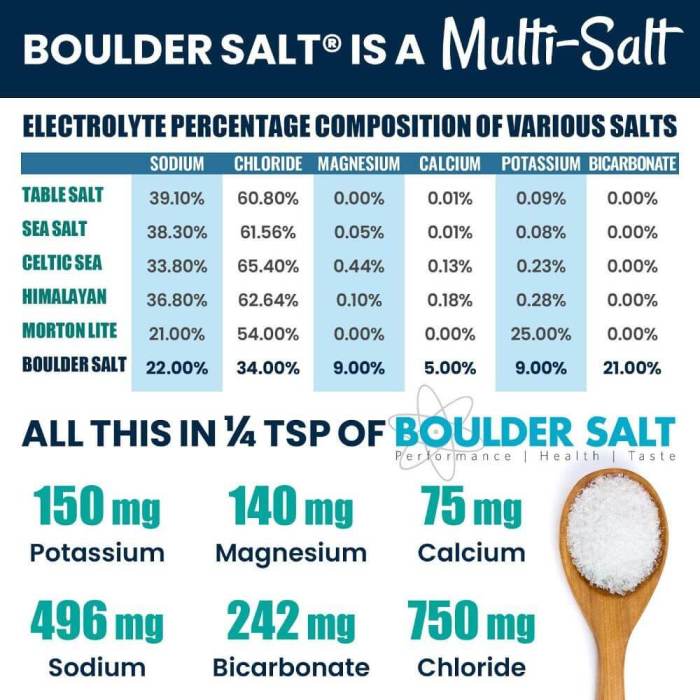Ingredients and Additives in Morton Salt

Morton salt nutrition facts – Yo, peeps! Let’s get real about what’s in that trusty ol’ Morton Salt shaker. We’re diving deep into the ingredients, additives, and how it stacks up against other brands. Think of it as a salt-tasting showdown, but way more factual.
Understanding Morton Salt nutrition facts, primarily its sodium content, is crucial for managing dietary intake. However, it’s important to consider the broader context of sodium consumption, which often extends beyond table salt. For example, a seemingly innocuous treat like a meat pie can significantly contribute to daily sodium levels, as highlighted by the detailed nutritional breakdown available at meat pie nutrition facts.
Therefore, a balanced perspective requires analyzing both Morton Salt’s contribution and the hidden sodium in other foods like meat pies to achieve optimal health.
Morton Salt’s main ingredient is, surprise surprise, sodium chloride (NaCl). That’s just fancy talk for regular table salt. But it’s not
-just* NaCl; there’s a bit more to it than meets the eye, especially when you consider the additives that keep it flowing smoothly and prevent clumping.
Morton Salt Ingredients and Their Purposes, Morton salt nutrition facts
Here’s the lowdown on what you’ll find in your average Morton Salt container. Knowing this helps you make informed choices about what you’re putting in your food, you know?
- Sodium Chloride (NaCl): This is the main event, the star of the show – the actual salt that gives your food that salty kick. It’s essential for maintaining fluid balance in your body.
- Dextrose (a type of sugar): This is an anti-caking agent. It helps prevent the salt from clumping together, keeping it nice and free-flowing in your shaker. Think of it as the salt’s personal bodyguard against clumping.
- Silicon Dioxide: Another anti-caking agent, this prevents the salt from sticking together and makes it pour smoothly. It’s a naturally occurring mineral found in sand and rocks, so it’s not as scary as it sounds.
Additives and Their Impact on Nutritional Content
The additives in Morton Salt, while affecting texture and preventing clumping, don’t significantly change the nutritional content. It’s still mostly sodium chloride. The small amounts of dextrose and silicon dioxide are not considered significant contributors to the overall nutritional profile. It’s all about maintaining quality and preventing those annoying salt clumps.
Comparison of Morton Salt to Other Brands
Let’s see how Morton stacks up against other popular salt brands. Keep in mind that ingredient lists can vary slightly depending on the specific product and batch.
| Ingredient | Morton Salt | Brand A | Brand B |
|---|---|---|---|
| Sodium Chloride | Yes | Yes | Yes |
| Dextrose | Yes | No | Yes |
| Silicon Dioxide | Yes | Yes | No |
| Other Additives (e.g., Magnesium Carbonate) | Potentially | Potentially | Potentially |
Note: “Brand A” and “Brand B” are placeholders for other common table salt brands. Specific ingredients and their presence may vary depending on the brand and specific product.
Dietary Considerations and Morton Salt: Morton Salt Nutrition Facts

Yo, Surabaya peeps! Let’s get real about Morton Salt and how it fits into your diet. We all know salt’s a staple, but it’s also a thing you gotta watch, especially if you’re trying to stay healthy and on top of your game. This ain’t about demonizing salt, it’s about understanding how much is
actually* good for you.
Morton Salt, like any table salt, is primarily sodium chloride. Sodium plays a crucial role in maintaining fluid balance, nerve impulses, and muscle contractions. Think of it like this: your body needs sodium to function properly, but too much can be a total buzzkill. We’re talking potential high blood pressure, water retention, and other not-so-fun health issues.
Sodium Intake and Health
Maintaining a balanced sodium intake is key for overall well-being. The recommended daily intake varies depending on factors like age, activity level, and underlying health conditions. Generally, health organizations suggest limiting sodium intake to less than 2,300 milligrams (mg) per day, with an ideal target of around 1,500 mg for many adults. Exceeding this can seriously impact your health in the long run.
Think of it like this: your body’s a finely tuned machine; too much salt throws off the balance.
Morton Salt and Dietary Restrictions
For those on low-sodium diets or following the DASH (Dietary Approaches to Stop Hypertension) diet, Morton Salt needs to be used sparingly. Low-sodium diets usually restrict sodium intake to less than 1,500 mg daily, while the DASH diet emphasizes fruits, vegetables, whole grains, and lean protein, all while limiting sodium. Using Morton Salt requires careful measurement and portion control to stay within these limits.
It’s all about being mindful of how much you’re adding to your food.
Sample Meal Plan with Balanced Sodium Intake
Here’s a sample meal plan showcasing balanced sodium intake, keeping in mind that sodium content can vary based on preparation methods and added ingredients. This is just a guideline, and it’s always best to check nutrition labels and adjust accordingly.
This plan demonstrates how to incorporate Morton Salt while keeping your daily sodium intake within a healthy range. Remember, portion control and mindful cooking are key.
- Breakfast (approx. 150mg sodium): Oatmeal with berries and a sprinkle of Morton Salt (a tiny pinch!).
- Lunch (approx. 300mg sodium): Grilled chicken salad sandwich on whole-wheat bread with a light vinaigrette. A small amount of Morton Salt is used in the chicken marinade.
- Dinner (approx. 400mg sodium): Baked salmon with roasted vegetables (broccoli, carrots, zucchini). A small amount of Morton Salt is used to season the vegetables and salmon.
- Snacks (approx. 100mg sodium): A small handful of unsalted almonds and a piece of fruit.
This sample meal plan shows that you can enjoy flavorful meals while maintaining a balanced sodium intake. Remember, it’s crucial to read nutrition labels and adjust your salt intake according to your individual needs and dietary requirements. Don’t be afraid to experiment with herbs and spices to enhance the flavor of your food instead of relying heavily on salt.
Clarifying Questions
Is Morton Salt iodized?
Many varieties of Morton Salt are iodized, meaning they contain added potassium iodide. Check the product label for confirmation.
Can I use Morton Salt on a low-sodium diet?
Morton Salt is high in sodium, making it unsuitable for strict low-sodium diets. Consider salt substitutes or low-sodium salt options.
Does Morton Salt contain anti-caking agents?
Yes, most Morton Salt products contain anti-caking agents to prevent clumping. These are typically listed on the ingredient label.
How does Morton Salt compare to Himalayan Pink Salt nutritionally?
Himalayan Pink Salt generally contains trace minerals, while Morton Salt is primarily sodium chloride. Nutritional differences are significant.
